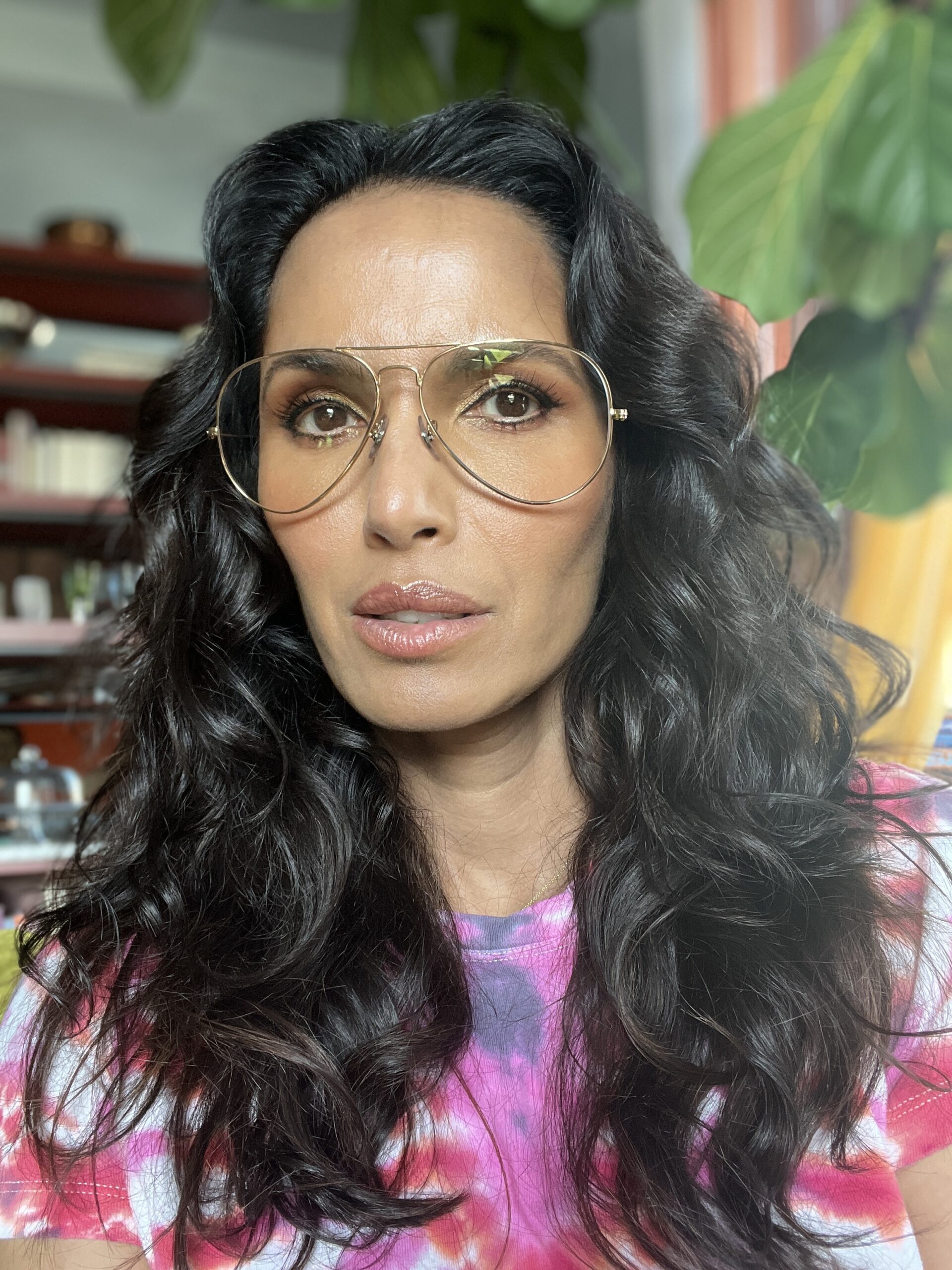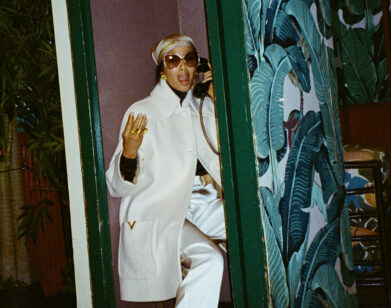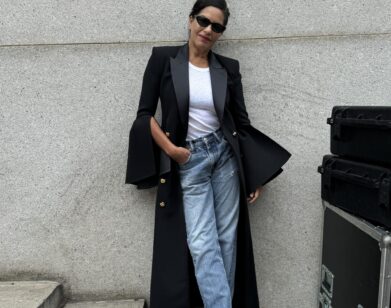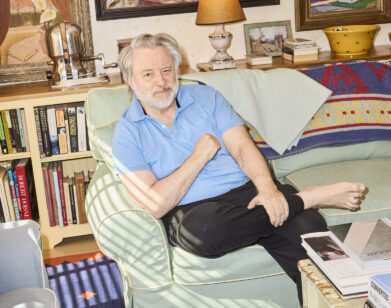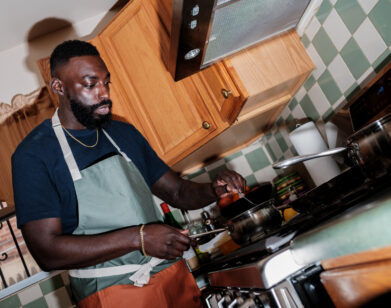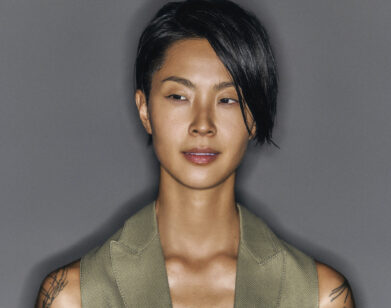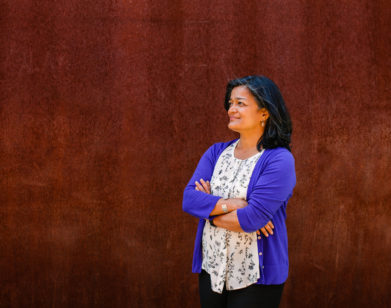IN CONVERSATION
Padma Lakshmi Tells Sarita Choudhury About Life After Top Chef
When Padma Lakshmi made the shocking announcement that the most recent season of Top Chef—an All Stars edition set in London—would be her last, the internet and culinary world reacted accordingly. After nearly two decades of hosting and producing the reality series, Lakshmi’s name had become synonymous with the beloved franchise. But Lakshmi, of course, is so much more than an Emmy Award-winning TV host. At 52 years old, she’s “lived a multitude of lives” as her close friend, the And Just Like That… actor Sarita Choudhury, put it during their phone call, in which Lakshmi reminisced on her early forays into literature and modeling (an encounter with Helmut Newton helped free her of insecurity). She’s also written quite a few bestselling books and, most recently, spearheaded a new television show, Taste the Nation with Padma Lakshmi, in which she foregrounds the diverse culinary offerings of immigrants from El Paso to Las Vegas, and beyond. As she readies for the next chapter, Lakshmi continues to add new experiences to an already prodigious career, like her recent appearance in Sports Illustrated’s swimsuit issue and her inclusion in Time Magazine’s annual list of the 100 most influential people in the world. Just before revealing her plans to leave Top Chef, Lakshmi and Choudhury got candid about motherhood, representation, activism, and, of course, food.
———
SARITA CHOUDHURY: Hi, Padma.
PADMA LAKSHMI: Hi. First of all, thanks for doing this, Sarita. I appreciate it. I know you’re busy.
CHOUDHURY: Well, we’re both busy and it’s so exciting because Interview Magazine is kind of the iconic magazine. So I was excited.
LAKSHMI: I know, and I’ve never been in it, so I’m super excited.
CHOUDHURY: Oh really? Well, babe, this is your time. Part of me just wants to ask personal questions, but I know we have to keep it a little clean. First of all, I want to know where you’re sitting right now.
LAKSHMI: I’m sitting at my desk in my office. Which you’ve been in, right?
CHOUDHURY: I was hoping you’d be in your bathtub.
LAKSHMI: I thought about it, but I didn’t know if it was Zoom or not. I know you’ve seen me in my bathtub.
CHOUDHURY: I think it’s the best bathtub in New York City. You know what’s interesting if people see our names, they’re both Indian names and I was thinking, “Oh, it would make sense, two Indian girls interviewing each other,” but in a weird way that is the least of our connection, even though it is one of our loveliest comforting connections. I wanted to ask you about that because we’re Indian, but we grew up also in the West. We are not necessarily the types to go on about what it’s like to deal with being Indian or not white—we’ve forged through, I don’t know how many different lives, to get where we are. Did you deal with anything growing up and being Indian in America?
LAKSHMI: Yeah, I’m sure that I did. I think everyone who is of color deals with it in some way. In my opinion, African Americans have it the worst by a mile because their ancestors didn’t choose to come here. It just was so evident in every aspect of life, from the magazines or billboards that we saw to the TV shows to the commercials and movies, to the air we breathe. It was just understood that if you weren’t white or Euro-American, as I like to call white people in this country, because I think it’s important that we all hyphenate our name and it seems just more fair that way. It was understood, just like the sky is blue and the grass is green, as a person of color, we’re not going to work as much, get as many auditions, get as many covers. You just kind of went over every speed bump, hill, or mountain you had to because you had a goal.
CHOUDHURY: I love this answer. Usually, we’re asked this question by someone non-Indian, and it’s almost comforting listening to you because it’s a given. It’s what you know. So, where were you when you started modeling? What country?
LAKSHMI: I was studying abroad in my last semester in Madrid.
CHOUDHURY: What were you studying?
LAKSHMI: I just got bored of college. I’d talked my way into a study abroad program, even though I had never studied Spanish before. We found an intro to Spanish program in Madrid, and so off I went. I only knew one person in Madrid who had graduated the year before from my college. He took me around and he introduced me to a modeling agent who was a friend of his. I only did it after school because I went to school from nine to one. I sort of came back to America, packed up my college apartment, got my not very useful degree in Theatre Arts and American Lit. I went back to move in with my mom in a suburb of Los Angeles because I was pretty much qualified to do nothing.
CHOUDHURY: Wait, did you say American literature? I know you’re a big reader, did your love for books come through that?
LAKSHMI: No, I think it came before that. My grandfather loved books and he could quote Shakespeare and Wordsworth to you. Those sorts of writers always flew past my head and bothered me. I had an amazing array of English teachers and social studies teachers. I really took to it then.
CHOUDHURY: Fantastic. You hear that in the way you talk. A question often asked of me is, “In your career, what are your favorite things you’ve done?” I never really see my career as my favorite thing. I see it as a kind of culmination that leads to things. So how did it all lead to Taste the Nation?
LAKSHMI: I mean, I wish it had come earlier in my career. My favorite thing that I’ve ever done professionally has been the memoir [Love, Loss, and What We Ate]. And after the memoir, Taste the Nation. If you look at both of those projects, they’re self-generated. I wish that Taste Nation had come earlier. I had certainly been trying to get it bought earlier. I mean six networks turned us down.
CHOUDHURY: No!
LAKSHMI: I think it also came about because of my own epiphany and call to action in the 2016 election when there was all this terrible vitriol about immigrants in this country during the campaign by Trump. The Muslim ban, “all Mexicans are rapists,” all that stuff. As an immigrant, it really pissed me off. I got involved with the ACLU. Tom Hanks recruited me along with Tina Fey. They were doing a telethon stream. That’s how I started. After doing that for two or three years, I really wanted to do something creative and artistic in my professional life. At first, I thought it would be a cookbook, and I researched this cookbook proposal, I had a producing partner. He looked at the proposal and he said, “This should be our show. It’s more your voice. I’ve never read anything like this.” That’s really how we started developing Taste the Nation. Everything happens at the time it’s supposed to. I guess I’m a late bloomer.
CHOUDHURY: That’s why you seem so young, though. It’s like you’re finally 34 now.
LAKSHMI: Yes, that’s how I feel.
CHOUDHURY: I know. I can see it. It’s also interesting because anyone who doesn’t know the show could enter thinking they’re going to see you, but you didn’t make yourself the protagonist. You found this weird balance where we enter with you, so we’re not afraid, and then we can join these people’s lives.
LAKSHMI: What I wanted to do with the show is give our participants the A-list treatment. We see only a certain swath of our culture. So what interested me was what if we light them well? What if we light them how I always wanted to be lit? I firmly believe that everybody has a fascinating story. You just have to be willing to look for it and listen. That’s my job as a writer. I approach Taste the Nation first as an auteur, I guess, of the show rather than on-air talent. I’m doing much more off camera in preparation and in post-production than the days we’re actually filming the show.
CHOUDHURY: I was realizing the way you look on Taste the Nation is the Padma I recognize so strongly. You’re totally listening and you don’t know what’s coming next. Can I ask you, how did the title come about?
LAKSHMI: We were struggling with the title. For a long time, it was called “Padma’s Untitled Show.” I knew that I wanted the food to be the gateway drug. Rather than getting on my soapbox and making a speech at an ACLU rally, the whole point of Taste the Nation was to show rather than tell. It’s not a journalistic show. It is a political show because food is a political subject, so it’s a play on Face the Nation. That’s how I came up with the title.
CHOUDHURY: Also, I love it because it’s active.
LAKSHMI: Yeah, I wanted to invite the audience to cross the street with me and meet their neighbors, who maybe they were a little curious about. The reason I didn’t want United or America in the title is because I wanted longevity. And, god willing, hopefully, if enough people watch the show in the next few months, we’ll get another season. What I would like to do is go abroad and have Turkish food in Berlin, Indian food in London, Thai food in Australia, Moroccan food in Paris. We’re at a time in our civilization when there’s more migration than at any other time in history. And that’s interesting, that bumping up of cultures is super interesting. You’ve lived in Italy, you’ve lived in other worlds, and all of that makes you who you are, and to me that makes you complex, interesting, and worth listening to. That cultural mashup is the key to why, in my opinion, American culture and pop culture are one of our greatest exports. And it’s one of the things that contribute to us being a superpower; it’s not just the military, it’s not just the powerhouse. The economic powerhouse is also powered by generations of immigrants who have toiled for a better life for themselves and have brought the American experiment forward.
CHOUDHURY: I love when you were talking about migration for a minute through food. Usually when we talk about migration, there’s a lot of sadness. Suddenly I was getting excited because you were talking about it through food. I also realize migration is so common, it’s not marginal. It is our world. That is what it is.
LAKSHMI: Definitely. We only call it marginal when it’s brown and Black folks.
CHOUDHURY: Exactly. That’s the only reason the word exists. One day, I opened Instagram, I almost fell onto the ground. I see the picture of you in Sports Illustrated… I don’t even know the word for it, because I’ve seen friends and actresses in beautiful outfits. I just want to say one thing, I feel like whenever people do shoots like that, they’re so overly retouched that I don’t recognize my friend, but I recognized you, your skin. I was very excited about that and I realized, “Oh, that’s what makes it even more powerful and beautiful.” I wondered how it felt for you.
LAKSHMI: Let’s see, I think the photos are impactful because there is a rawness to them. Of course, those bathing suits had been fit for me. Although one could argue that they’re a bit small, especially up top.
CHOUDHURY: That’s what makes it better, no?
LAKSHMI: This is a new experience for me because Yu Tsai, the photographer who shot it, who I love and I’d wanted to work with—he finally shot my skin the color it is.
CHOUDHURY: That’s what I mean. Also, I’m Indian, I know Indian skin, and I realize I don’t get to see it ever.
LAKSHMI: Yeah. It’s not easy to shoot. They’ll always throw you in the bright sun because they think they need more light…
CHOUDHURY: So they can see it.
LAKSHMI: I didn’t have to squint, which was the experience I had in my twenties and thirties as a model. This amazing lucky confluence of Sports Illustrated coming out, Taste the Nation coming out. I had been home for a month after being on the road with both shows, literally from February to October. I had been working out like a beast. But also after eating all that heavy food on Top Chef, it’s the only thing that helps—eat plain and mostly Indian food at home, but also exercise. So I was on my way, but then I got the call in November and I had literally three-and-a-half weeks to get in shape. When you look at those pictures, I wasn’t any smaller in size than I am normally. I hover in my normal life between 140 and 145 pounds. I think there was just something that… it was my time.
CHOUDHURY: I was hanging out with you a month ago and with your daughter, who’s amazing, and your mom. I was lucky that day, I got all three generations. I know what it’s like to do press for one thing coming out, but you’ve had so many things coming out. Within the life of a mom, how does that play out at home?
LAKSHMI: She gets it, but it does wear on her sometimes. I mean, I think more than the interviews, last year was really tough for both of us. I had a two-week work week with Taste the Nation and then from August to October, I was just gone for six weeks for Top Chef. She came for two weeks of it. That was tough. The press is also tough, but I try to just prepare her for it. Obviously, I’m a single mom, we share the holidays equally, so she’ll go to her dad’s for half the summer. As you know, she wants to be a performer herself. I hope that now that she’s 13, she’s also absorbing how difficult it is to do all that. The hustle has to be there, even if you do get handed a role or a show or an album or whatever the hell.
CHOUDHURY: I think we’re lucky we have daughters, because they get it profoundly. But they also need us. And we need them to need us because we couldn’t just do this. It would not be enough for us, in a weird way.
LAKSHMI: Oh, totally. I mean, you’ve done so well with your girl because she’s so well-adjusted, so poised, and graceful.
CHOUDHURY: Thank you.
LAKSHMI: That’s hard when you are the daughter of somebody who for so many people is such an icon.
CHOUDHURY: Oh my god, that word.
LAKSHMI: I know, I hate that word too. But it’s true, Sarita, because recently I got asked to do this video saying who my AAPI inspirations were. You flew into my mind so quickly, it was shocking how obvious it was. I didn’t even bat an eye.
CHOUDHURY: Oh, thank you, love.
LAKSHMI: For so many of us, it was such a revelation. Not only that you got the part with Denzel [Washington] and Mira [Nair], but because of your unabashed performance in it [Mississippi Masala]. I was a teenager, and it was so revolutionary when that film came out. It could have been a part that was so stereotypical. I mean, even that would’ve been a win, because who the hell did we have?
CHOUDHURY: We had nothing.
LAKSHMI: We had nothing. We had Apu on The Simpsons.
CHOUDHURY: You know what I always say? I wish I had had a Mississippi Masala because when you’re in a film, you don’t really get to see it for what it is. People think, “Oh my god, you were so free in that.” But I had an Indian family, so I had to be careful, and I was scared.
LAKSHMI: Definitely. I felt that way as a model when I first shot with Helmut Newton.
CHOUDHURY: Oh my god, yes.
LAKSHMI: I was so scared and I actually canceled on him. And of course, as you can imagine, my agency was so angry with me.
CHOUDHURY: Too much sexiness?
LAKSHMI: Well, I didn’t want to pose nude and Helmut was doing a series called “Big Nudes Two,” and it was a private commission and he wanted me for that. I booked the job and then three days before I canceled. And luckily for me, he called me back a couple months later and he was like, “What about if it’s just topless and what if it’s for the Lavazza calendar?” So we drove down from Milan all the way to Monte Carlo and he shot me at the Grand Hotel. He shot a portrait of me where I had nothing but shoes on. And then you see the scar, because he loved my scar.
CHOUDHURY: Oh, of course he did.
LAKSHMI: That changed my own opinion about my body and my scar.
CHOUDHURY: Brilliant to take a little bit of power even though you were scared to lose it forever. I can so see why Helmut Newton loved you. In a way, the same way Sports Illustrated kept your skin. My last question is, what is your idea of moments of freedom, where you just take a moment for yourself?
LAKSHMI: I mean, sometimes I try to take half-an-hour here and there where I just go up to my bedroom. As you know, my office is the next door apartment to my home. So that’s easy for me to do. Going to the gym is my solace. Usually, I’m just putting my headphones on and no one’s talking to me.
CHOUDHURY: And you’re sweating.
LAKSHMI: I don’t run, but I do jump rope or lift weights or boxing. I’ve been boxing for 20 years on and off.
CHOUDHURY: That’s why you’ve got good arms.
LAKSHMI: That’s the only reason. It’s not anything else. But also on the weekend, when Krishna is gone, my idea of heaven is having a plate of yummy sandwiches, samosas, or something on the bed, taking a hot bath after a good workout, putting on crisp pajamas, reading the whole day, watching the sunset outside my bedroom window. I know that’s not very glamorous or exciting, but that is a slice of heaven.
CHOUDHURY: It relaxes me just hearing that.
LAKSHMI: Honestly, laying in bed with you or another friend and just whiling away the time.
CHOUDHURY: I remember calling you one day and you were like, “What are you doing? Should we do something?” And I was like, “Could I come over and just lie on your floor in front of the fire?” And you were like, “Please.”
LAKSHMI: And you know there’s always something in the fridge to eat.
CHOUDHURY: Oh my god. Yes.

